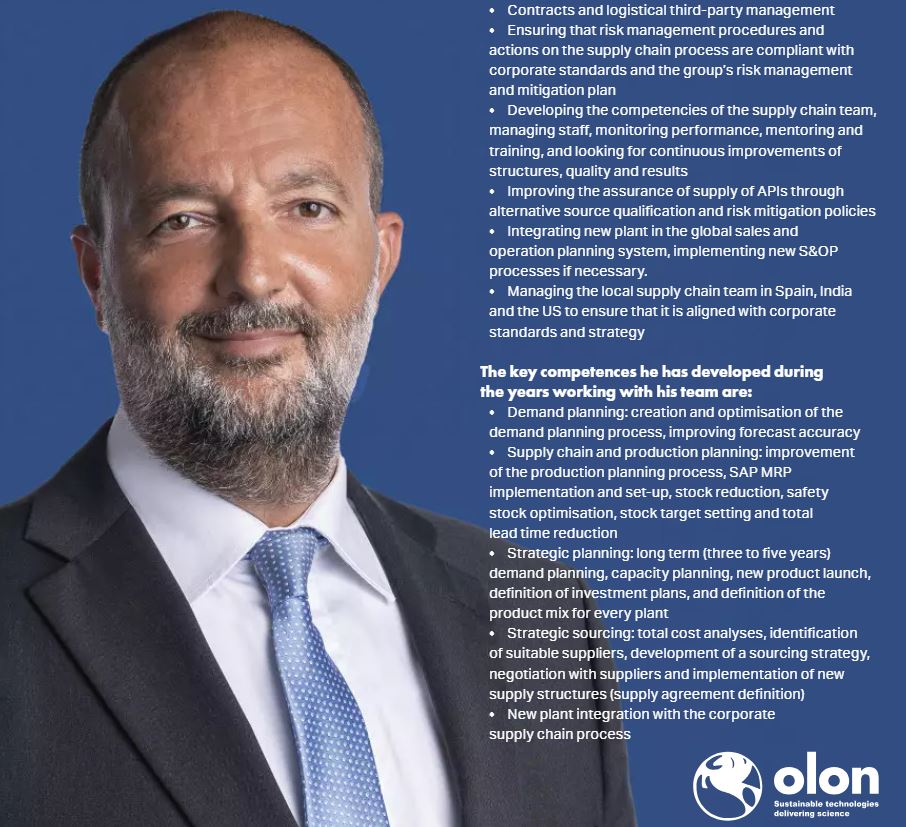Italian CDMO Olon has made its operating model more resilient by going against the grain and diversifying both its supply base and its research and manufacturing network. Cristiano Capriotti is the man in charge
What is the emerging geopolitical scenario and what effects does it have on global and interconnected pharmaceutical supply chains? Is the continuing destabilisation that we have witnessed in recent years changing the planning strategy of global pharma companies?
The COVID-19 pandemic undeniably marked the start of a new era of ‘polycrisis’, characterised by continuous, frequent and devastating crises. Olon — a leading API supplier with HQs in Italy and a global manufacturing network comprising 11 production sites and seven research centres worldwide — has discovered the key to transforming crises into opportunities and making its complex operational model resilient and flexible: diversification and a multicentre approach.
“The mantra in supply chain management has long been ‘reduce, reduce, reduce’: reduce production centres, reduce the number of suppliers and reduce stocks of raw materials,” explains Cristiano Capriotti, head of global strategic planning and supply chain at the Olon Group.
However, he adds, this pursuit of leanness has also brought with it the risk of diminished resilience, reducing the extra capacity of the production system, pushing the ‘just in time’ approach to extremes, and forcing the system. “Companies have been centralising production in a handful of large hubs of maximised production, with substantial long-term investments, in order to achieve maximum efficiency.
But being lean does not always allow you to be responsive to the market, particularly in situations of continued instability, such as we are experiencing today and will continue to experience for some time,” Capriotti observes. “Historically – not just since the crisis – Olon has seen the elimination of suppliers as a decrease in the company’s wealth. Through great investment from the entire organisation, including regulatory and QA sectors, we have pursued a structured assurance of supply programme, based on continuous risk analysis and the diversification of geopolitical areas of suppliers, wherever possible keeping European suppliers. We have adhered to the principle of not being dependent on one region, which can cause unforeseen problems and supply disruption, such as the closure of connecting channels we are seeing today.”
Olon’ s mantra against this problem has thus been a multi-centre approach. The company has pursued a strategy of incremental, decentralised and multifunctional investments in all of its sites around the world. In the immediate term, this has certainly entailed higher costs. In the long term, it promises resilience and minimizes the risk of our operating system collapsing due to external factors.
“We have invested our systems to make them interchangeable and, in our technologies, to make them interoperable. Today we are able to provide customers with a global system response, rather than a single site response, and to react swiftly to fluctuating demand. This translates into great elasticity, flexibility and speed,” Capriotti says.
In certain cases, Olon has doubled the production capacity for high demand products at very competitive times in the market. “Today, the best choice is the one that leaves more options open for you because your system never stops. Our strategy has proven to be an asset.”
Read the full interview at the following link: https://joom.ag/BjAd/p36

